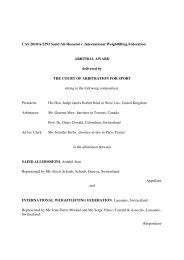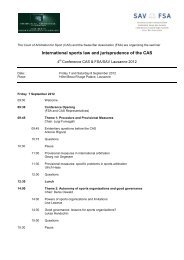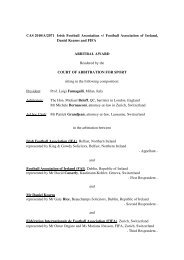(CAS) Bulletin - Tribunal Arbitral du Sport / TAS
(CAS) Bulletin - Tribunal Arbitral du Sport / TAS
(CAS) Bulletin - Tribunal Arbitral du Sport / TAS
You also want an ePaper? Increase the reach of your titles
YUMPU automatically turns print PDFs into web optimized ePapers that Google loves.
appeals arbitration proceedings, absent agreement<br />
of the parties, it is “the law of the country in which the<br />
federation, association or sports-related body which has issued<br />
the challenged decision is domiciled or according to the rules<br />
of law, the application of which the [<strong>CAS</strong>] Panel deems<br />
appropriate” 65 .<br />
Despite having express authority to do so, the <strong>CAS</strong><br />
rarely relies on national law other than Swiss law<br />
(the IOC, WADA, and most IFs are domiciled in<br />
Switzerland) to invalidate Olympic and international<br />
sports governing body agreements and rules 66 . For<br />
example, recognizing the need for a uniform body of<br />
global sports law, <strong>CAS</strong> panels generally have refused<br />
to rule that athlete doping rules and sanctions violate<br />
the national laws of an athlete’s home country 67 .<br />
Similarly, in appeals arbitration resolving other<br />
types of disputes, the <strong>CAS</strong> generally has declined<br />
to apply national laws other than the domestic law<br />
of an international sports governing body’s home<br />
country 68 .<br />
The Swiss Federal Code on Private International<br />
Law provides for judicial review of a <strong>CAS</strong> arbitration<br />
award by the SFT on very narrow grounds 69 . The<br />
SFT is authorized to vacate an arbitration award if the<br />
<strong>CAS</strong> panel was constituted irregularly, erroneously<br />
held that it did or did not have jurisdiction, ruled on<br />
matters beyond the submitted claims, or failed to rule<br />
on a claim 70 . An award also may be vacated if the<br />
<strong>Sport</strong>, art. 17, http://www.tas-cas.org/adhoc-rules (follow “Arbitration Rules<br />
for the Olympic Games” hyperlink) (last visited Sept. 11, 2010).<br />
65. Arbitration Code, supra note 9, r. 58.<br />
66. On the other hand, <strong>CAS</strong> arbitrators have expressed a willingness to<br />
rely on (or to at least survey) national laws when developing a rule of law<br />
to govern a dispute that cannot be resolved solely by applying a sports<br />
governing body’s internal rules. See, e.g., Arbitration <strong>CAS</strong> 2004/A/704,<br />
Yang Tae Young v. Int’l Gymnastics Fed’n, award of Oct. 21, 2004<br />
(considering the extent to which courts have been willing to judicially<br />
review and interfere with a referee’s application of the rules of the game<br />
or fi eld of play decision).<br />
67. See, e.g., Arbitration <strong>CAS</strong> 2007/A/1312, Adams v. CCES, award of<br />
May 16, 2008 (fi nding no violation of Ontario Human Rights Code);<br />
Arbitration <strong>CAS</strong> 2006/A/1149 and 2007/A/1211, World Anti-Doping<br />
Agency (WADA) Federación Mexican de Fútbol (FMF) & Alvarez,<br />
award of May 16, 2007 at para. 35 (rejecting athlete’s claimed violation of<br />
Mexican law); Arbitration <strong>CAS</strong> 2006/A/1102, Eder v. Ski Austria, award<br />
of Nov. 13, 2006 (refusing to use Austrian law to invalidate challenged<br />
World Anti-Doping Code rules or their application to Austrian athlete<br />
by Austrian national governing body); Arbitration <strong>CAS</strong> 2005/A/951,<br />
Cañas v. ATP Tour, award of May 23, 2007 (fi nding no violation of<br />
Delaware, U.S. antitrust, or European Union law).<br />
68. Arbitration <strong>CAS</strong> 2006/A/1110, PAOK FC v. UEFS, award of Aug.<br />
25, 2006 (rejecting Greek football club’s request to apply Greek law to<br />
club licensing dispute with UEFA).<br />
69. See PIL, supra note 19.<br />
70. In X. (Cañas) v. ATP Tour, 4P.172/2006 (2007) (Switz.), ATF 133 III<br />
235, translated in 1 Swiss Int’l Arb. L. Rep. 65, the SFT vacated and<br />
remanded a <strong>CAS</strong> award because it violated an athlete’s right to a fair<br />
hearing by not providing reasons for rejecting arguments that his doping<br />
sanction violated Delaware, U.S., and European Union laws. The SFT<br />
ruled that <strong>CAS</strong> arbitrators must discuss all of the parties’ arguments in<br />
their legal analysis of the relevant issues in dispute, including claims<br />
that applicable national or transnational laws have been violated. The<br />
panel must explain “if only briefl y” their reasons “so that the petitioner<br />
could be satisfi ed upon a perusal of the award that the arbitrators had<br />
considered all of his arguments which had objective relevance, even if it<br />
was to dismiss them ultimately”. Id. at 39.<br />
parties are not treated equally by the <strong>CAS</strong> panel, if<br />
a party’s right to be heard is not respected, or if the<br />
award is incompatible with Swiss public policy 71 .<br />
To date, the SFT has uniformly rejected all challenges<br />
to the substantive merits of a <strong>CAS</strong> panel’s decision 72 .<br />
A <strong>CAS</strong> award may be challenged on the ground<br />
that it is incompatible with Swiss public policy, but<br />
such a claim has not been successful. The SFT has<br />
explained that this defense “must be understood as a<br />
universal rather than national concept, intended to penalize<br />
incompatibility with the fundamental legal or moral principles<br />
acknowledged in all civilized states” 73 . The SFT has ruled<br />
that “even the manifestly wrong application of a rule of law<br />
or the obviously incorrect fi nding of a point of fact is still not<br />
suffi cient to justify revocation for breach of public policy of an<br />
award made in international arbitration proceedings” 74 . It<br />
has characterized this standard as “more restrictive and<br />
narrower than the argument of arbitrariness ” 75 .<br />
Because the “seat” of all <strong>CAS</strong> arbitrations is<br />
designated as Lausanne, Switzerland, regardless<br />
of the geographical location of the hearing, a <strong>CAS</strong><br />
award is a foreign arbitration award in all countries<br />
except Switzerland. Thus, <strong>CAS</strong> arbitration awards<br />
require judicial recognition by national courts to<br />
be legally enforceable outside of Switzerland. The<br />
United Nations Convention on the Recognition and<br />
Enforcement of Foreign <strong>Arbitral</strong> Awards (New York<br />
Convention), a treaty to which the United States,<br />
Australia, and more than one hundred other countries<br />
are signatories, provides for judicial recognition and<br />
enforcement of foreign arbitration awards, including<br />
<strong>CAS</strong> awards, by national courts 76 .<br />
Article V(2)(b) of the New York Convention states<br />
that a national court may refuse to recognize and<br />
enforce an arbitration award if doing so “would be<br />
contrary to the public policy of that country” 77 . Consistent<br />
with the SFT, U.S. courts have strictly construed the<br />
“public policy” defense and have uniformly recognized<br />
the validity of foreign sports arbitration awards,<br />
71. See PIL, supra note 19, art. 190. See generally Antonio RIGOZZI,<br />
Available Remedies Against <strong>CAS</strong> Awards, in <strong>Sport</strong> Governance,<br />
Football Disputes, Doping and <strong>CAS</strong> Arbitration (M. BERNASCONI & A.<br />
RIGOZZI eds., 2009).<br />
72. RIGOZZI, supra note 71, at 134-41.<br />
73. N., J., Y., W. v. Fédération Internationale de Natation (FINA),<br />
5P.83/1999 (2d Civil Court, Mar. 31, 1999) at 779.<br />
74. Id.<br />
75. G. v Fédération Equestre Internationale, (1st Civ. Ct., Mar. 15, 1993)<br />
(translation) in Digest of <strong>CAS</strong> Awards 1986-1998, at 561, 574 (Matthieu<br />
REEB ed., 1998).<br />
76. United Nations Convention on the Recognition and Enforcement of<br />
Foreign <strong>Arbitral</strong> Awards, June 10, 1958, 21 U.S.T. 2517 [hereinafter New<br />
York Convention]; Abbas Ravjani, The Court of Arbitration for <strong>Sport</strong>:<br />
A Subtle Form of International Delegation, 2 J. Int’l Media & Ent.<br />
L. 241, 251 (2009) ( “<strong>CAS</strong> has had success in having its judgments that arise<br />
from contractual disputes enforced, while [International Court of Justice] judgments<br />
arising out of treaties often have trouble being enforced.”).<br />
77. New York Convention, supra note 76, art. V(2)(b).<br />
Articles et commentaires / Articles and commentaries<br />
-<br />
10





